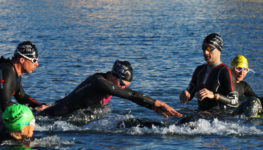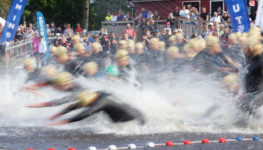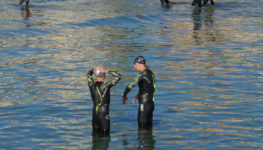Swim effectively to conquer triathlon
How well you swim plays a significant part in how well you race. Very rarely do you see someone with a poor (relatively) swim perform well overall in a triathlon.
In the early days of triathlon, ex-swimmers performed extremely well, and often dominated, triathlons around the world; Dave Scott, Mark Allen, Robin Brew, the list goes on.
Being able to use their swim ability to lead from the front not only put them into a race leading position but their swim effectiveness, or efficiency, meant they expended less energy in doing so.
This latter point, being effective, is a critical point for modern triathletes to be aware of. To win a triathlon it is essential that swim training forms a significant part of overall training.

The common swim training approach
The more effective your swim, or the faster you swim using less energy, the more you save for the bike and run. This being the case, why do many triathletes not account for this in their training?
Age group athletes tend to view triathlon as three different sports (swim, bike and run) and look at the ratio of time spent in each discipline. Swimming, in terms of time and distance, appears to be the least significant part of a triathlon (1.7% in an Ironman). It is also often the least enjoyed discipline. A typical mindset approach of “I can use my great bike and run to make up for my poor swim” is very common.

Unfortunately, this is the wrong approach. The swim is often so exhausting that no matter how good your bike and run, your ability to replicate this in a race will have been compromised by the excessive effort applied in the swim!
Triathlon and swim science
Don’t just take our word for it; research into race tactics and training regimes have shown this to be true. This study1 focussing on the importance of the swim, shows that swim training and correct pacing of the swim in a race results in a positive end (race) result. The practical side of the study showed that elite athletes can be up to 1min 45sec faster over a sprint distance race!
The overall conclusion: (elite) “triathletes must place equal importance on their swim training as that of both cycling and running.”
If an elite can knock off a full 1min 45sec over a sprint triathlon simply by being more effective whilst swim training. it should be possible for a well trained age group triathlete to see much bigger gains.
The less energy is expended in the swim, the more is left to perform well on the bike and then the run.
The same study showed that racing at your pool swim time trial pace (often called critical swim speed, threshold pace, race pace) will hinder your ability to bike and run well. A more effective pace to swim is at 80% of your swim time trial pace to realise the ability to perform well on the bike and run.
Start changing your approach
Simply swimming more is a good start! To really benefit though, you need to look at the way you approach swim training. Brett Sutton explains the use of “drills” (not the definition you may expect) and touches on the importance of doing what is needed for the race requirements.
There are two main considerations you need to factor:
 What to do when swim training – just swimming more, pushing more, using paddles more for strength and muscular endurance – NO kicking drills; and
What to do when swim training – just swimming more, pushing more, using paddles more for strength and muscular endurance – NO kicking drills; and- Correct pacing – using your perceived effort to guide you, just like it should in a race
Conclusion
First, start placing more importance on regular swim training and focus on correctly performing the right movements (NOT technique and drills).
Secondly, develop swim strength along with aerobic fitness for muscular endurance so you can be more efficient; enabling you to swim fast with a low impact on your energy levels.
Thirdly, learn to pace by feel so you are able to transferred the skill to racing; remember training race pace should NOT be your race day race pace!
Focus your swim training programme so you are strong enough to sustain the movement at a high pace. And remember, this high pace is actually a moderate intensity!
References
1 Effect of swimming intensity on subsequent cycling and overall triathlon performance.
PD Peeling, DJ Bishop, GJ Landers, University of Western Australia



